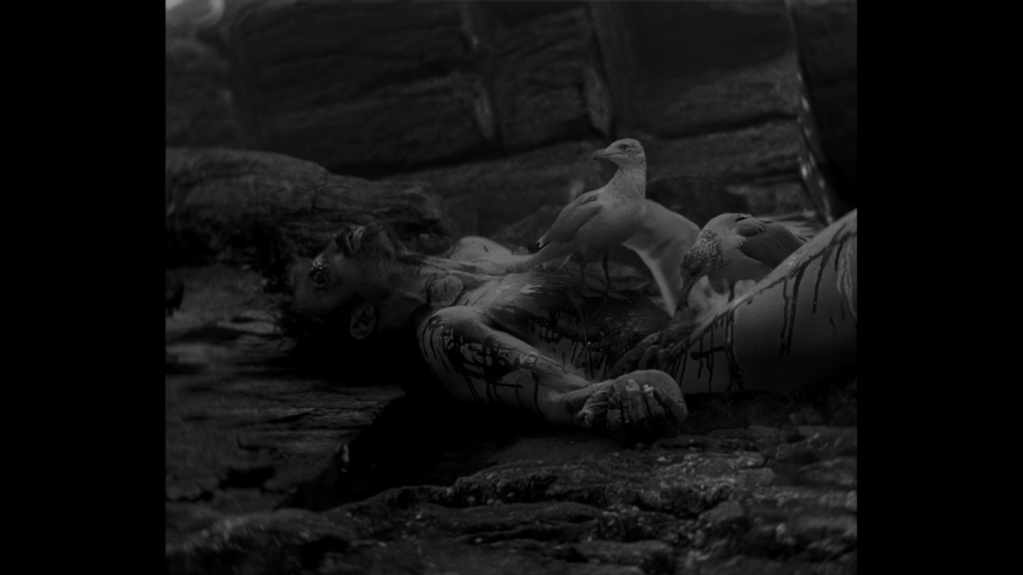Written by Alexander Greco
May 11, 2019
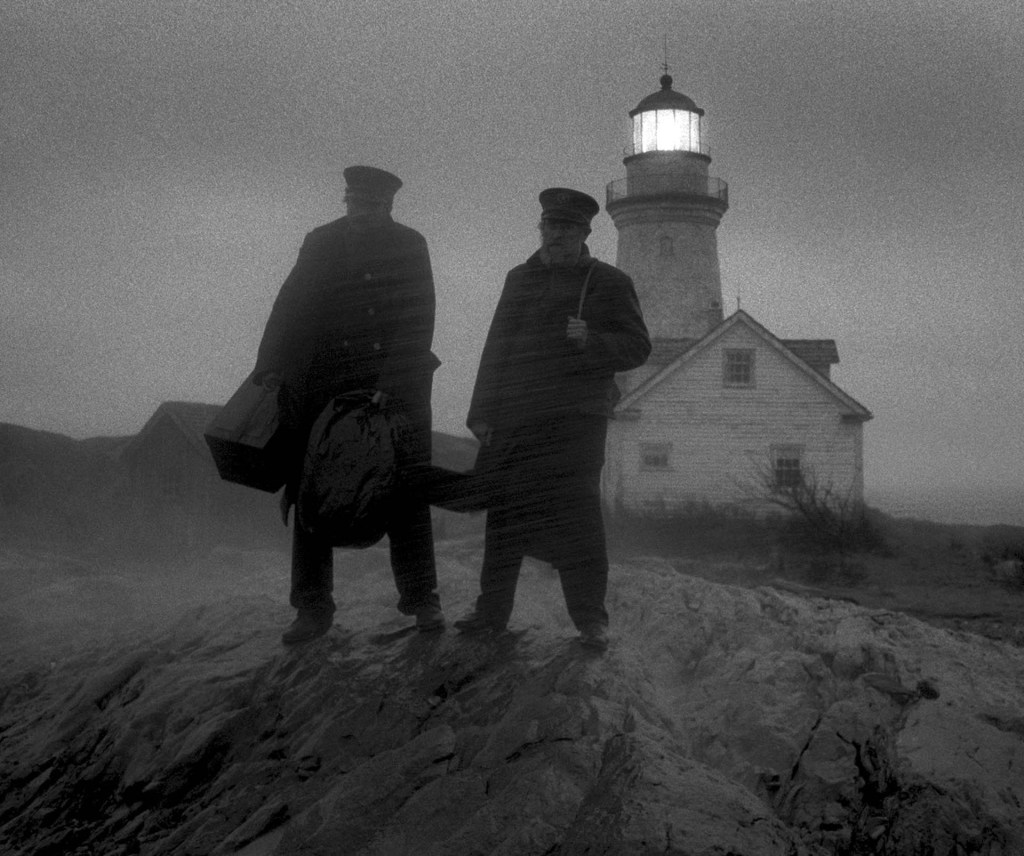
Max and Robert Egger’s 2019 “The Lighthouse” is a surreal dark comedy horror film, reminiscent of “Eraserhead”, “Dead Man” and “The Wickerman”. Set in the late 1800’s on a small, isolated island, “The Lighthouse” portrays the slow descent into madness of Ephraim Winslow (Robert Pattinson) and Thomas Wake (Willem Dafoe) with a subtle, well-balanced mix of gritty realism and dream-like paranoia. The film is both disturbing and fascinating, bewildering audiences and critics with its near-schizophrenic plot, bizarre and bipolar dialogues and the stark, dream-like imagery presented in Ephraim’s growing insanity. However, despite the tangled web of absurdity, ambiguous symbolism and distorted reality, the film is highly intentional in its events and imagery, and “The Lighthouse” yields great depths of meaning once the layers of its web have been dissected.
The first problem with understanding this movie is the immense intentionality in every shot. Many scenes in “The Lighthouse” might take an hour or more to decompose, especially in relationship or in context to every other scene in the film. Despite this, I will try to summarize the movie as briefly as I can without losing important cohesiveness. The second problem is this problem of density and complexity. There’s honestly too much in this movie to discuss without writing at least another 2-3 analyses of the same length as this one. However, I intend to only follow one thread of analysis here (a long and at times winding thread, but one thread nonetheless).
“The Lighthouse” begins with the arrival of Ephraim and Tom to the mid-ocean lighthouse they will be manning for the next four weeks, the two of them entirely isolated from society for a month. Tom, the senior lighthouse-keeper, makes it clear to Ephraim, the new junior, that the duty of maintaining the actual lighthouse will solely be Tom’s responsibility, and the manual labor (shoveling coal for the foghorn, cleaning and maintaining the house, purifying the cistern and so forth) will be left entirely to Ephraim. Tom wavers between being intensely critical of Ephraim and tyrannically domineering; and being warm, friendly and jovial with Ephraim, usually during their dinner.
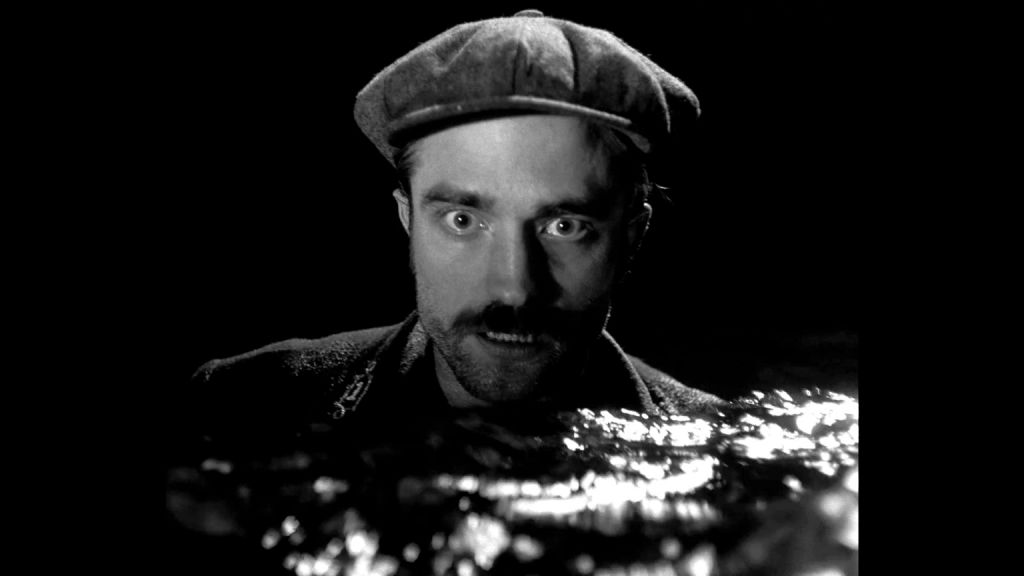
Shortly into the film, we witness the beginning of both characters’ insanity. Tom stands in front of the Lighthouse at night and removes all of his clothes, speaking to the lighthouse lamp affectionately. Then, Ephraim goes out to the ocean shore and sees wooden logs floating in the water, before seeing a dead body in the water. Ephraim walks into the water until he is fully submerged, then sees a mermaid or siren swimming in the water, screeching at him.
Over dinner, Tom tells Ephraim about his time as a ship captain and how he solved a mutiny by giving his sailors liquor until they made it to land. After telling Ephraim how his former junior-keeper went mad and died, Tom tells Ephraim he shouldn’t kill seagulls because its bad luck, and Tom later explains seabirds are the souls of dead sailors. In the next scene, Ephraim masturbates in the supply shed to a small, ivory trinket shaped like a mermaid he found in the beginning of the film.
Leading up to the midpoint of the film, we begin to see the intensification of a master-slave relationship between Tom and Ephraim, with Tom repeatedly calling Ephraim a dog and treating him as subhuman, juxtaposed with a much friendlier relationship between the two.
Ephraim goes to the top of the lighthouse one night, where he hears Tom muttering to himself. White slime drips from the metal grate above Ephraim, where Tom is standing, and Ephraim then sees a tentacle slithering across the metal-grate above. Ephraim eventually kills a seagull, which has been continually harassing him, and this action causes the wind to change direction. A storm rolls in just before the two are to be relieved of their duties at the end of their four-week stay. They find themselves marooned on the island, and either Tom’s or Ephraim’s sense of time begins to slip.
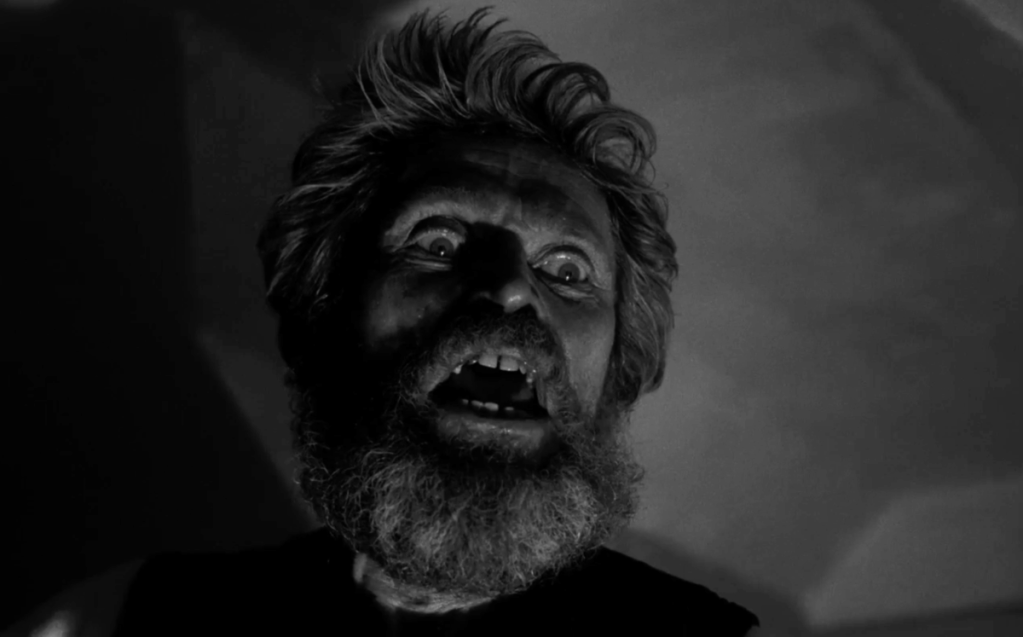
At the midpoint, Tom gives one of the greatest monologues in cinema-history as he curses Ephraim in the name of Neptune for a whole two minutes (as a side note, Willem Dafoe won at least 8 awards for his performance in this film, and was nominated for at least 17 others). As the two keepers remain stranded on the island, they steadily drink more and more alcohol, Ephraim continues furiously masturbating in his spare time and reality slips into a strange back-and-forth state of hallucination, paranoia and glimpses of sanity. Ephraim reveals that his name is actually Thomas Howard and that he let his former foreman, Ephraim Winslow, drown to death before taking his foreman’s name (you will probably forget this detail, but, nonetheless, try to remember it for the very end). Ephraim (or Tommy) tries to leave the island, but Tom chases him down with an axe and destroys the island’s only lifeboat. After calming down, Tom tells Ephraim that they’ve run out of alcohol, so the two begin drinking lamp oil (likely to be kerosene).
The storm, which has been raging for weeks, days or months now, finally ends after flooding the island and the lighthouse, all but ruining the home they’ve been staying in. Ephraim wakes up and finds Tom’s logbook and finds that Tom has been writing highly critical notes about Ephraim, even going so far as to say Ephraim should be fired from the job without being paid. Ephraim attacks Tom, and the two begin grappling, punching and strangling each other. After a hallucinatory moment where Ephraim sees Tom as his former foreman, the siren he’s been fantasizing about and masturbating to and as the sea-god Neptune himself, Ephraim nearly beats Tom to death.
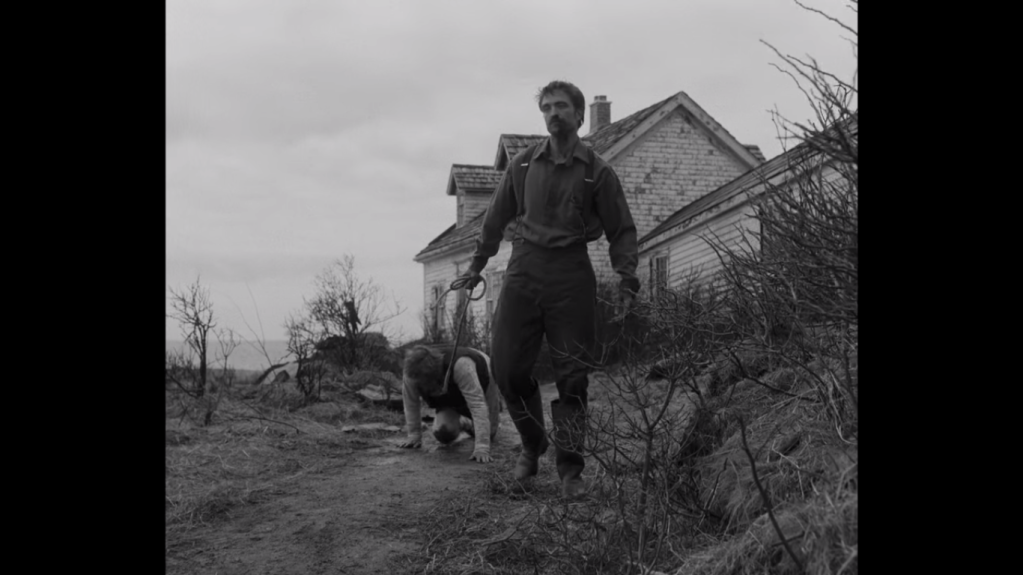
Stopping himself before killing Tom, Ephraim stands over Tom and begins commanding Tom to bark like a dog. Ephraim then leads Tom out of the building on a leash to a hole they previously dug in front of the Lighthouse. Ephraim begins burying Tom, while Tom gives another masterful dialogue about “Protean forms”, “Promethean plunder”, “divine graces” and “the fiddler’s green”. Once Tom is presumably dead, Ephraim steals the key to the lighthouse, but, once inside the building, Tom returns with an axe and strikes Ephraim with it. Ephraim takes the axe, kills Tom and proceeds to the top of the lighthouse.
Ephraim reaches into the lighthouse lamp, presumably reaching into the lamp-flame, and begins laughing and screaming as the light engulfs him, then falls down the stairs to the bottom of the lighthouse. The movie ends with Ephraim laying naked across a rock formation alongside the ocean. Seagulls have shit on his body, and they are now devouring the innards of a still-living Ephraim. And that’s the movie.
There are a few other notable details to mention here. There is a foghorn on the island, which can be heard in the background throughout the movie, as well as a ticking clock which is likewise heard throughout the movie. There are a number of Christian and Greco-Roman allusions throughout the movie, as well as allusions to maritime folklore. In addition, there are quite a few phallic symbols throughout the movie, as well as a large (like, dinner-platter-sized) mermaid vagina. However, I probably won’t be able to get into all the various symbols and their potential meanings.
To begin understanding the movie’s deeper meanings, we need to understand the relationship between Ephraim and Tom, Ephraim and the mermaid, the lighthouse itself and Ephraim’s character. What we find here are the psychoanalytic dynamics of the Ego (Ephraim), the Super-Ego (Tom), the Id and the Anima (the mermaid/siren), and the Self or the Godhead (the lighthouse). Ephraim is the individual struggling against the forces of the Super-Ego/Authority/Society and the Id/Sexuality/Material-Satiation in order to find freedom and independence, as well as to reunite with the Self or the Godhead, symbolic of the power and freedom of true individuality.
How do we pull such a lofty meaning from such a bizarre movie?

At its core, “The Lighthouse” is a mythological psychodrama. The movie is about an individual struggling with God the Father and the Sirens of instinct and sexuality. It is about an individual struggling with the oppressive demands and absurd behaviors of society, as well as struggling with one’s own nature—an individual struggling against these forces in order to maintain their individuality.
Ephraim is the Everyman, a term describing an ordinary, non-spectacular character whom the audience can sympathize with because of their mundanity. Ephraim, despite moments of fluctuating insanity, is mostly level-headed throughout the movie, and most of his actions or reactions seem sane compared to Tom’s. Ephraim is relatable—he’s the average person working a shitty job with an overbearing boss—and he reflects many of the ideas and hopes that most people share. Not only does Ephraim share these hopes with the audience, but Tom frequently reminds Ephraim of the mundanity of these hopes.
Ephraim remains pretty quiet throughout the first act of the movie, to which Tom tells him he’s not special in that regard. At one point, Ephraim tells Tom about his plans to build a house somewhere, so he can be free of others’ demands. Tom replies to this with, “Same old boring story, eh?” Midway through the third act, Ephraim begins telling Tom of his troubled past, and Tom tells him, “Yer guilty conscience is ever as tiresome-boring as any guilty conscience.” Then, near the end of the film, Tom begins telling Ephraim how unspectacular he is, saying things like:
“Come to this rock playin’ the tough. Ye make me laugh with yer false grum.”
“Ye pretended to mystery with yer false quietudes, but there ain’t no mystery.”
“Ye’re an open book. A picture, says I.”
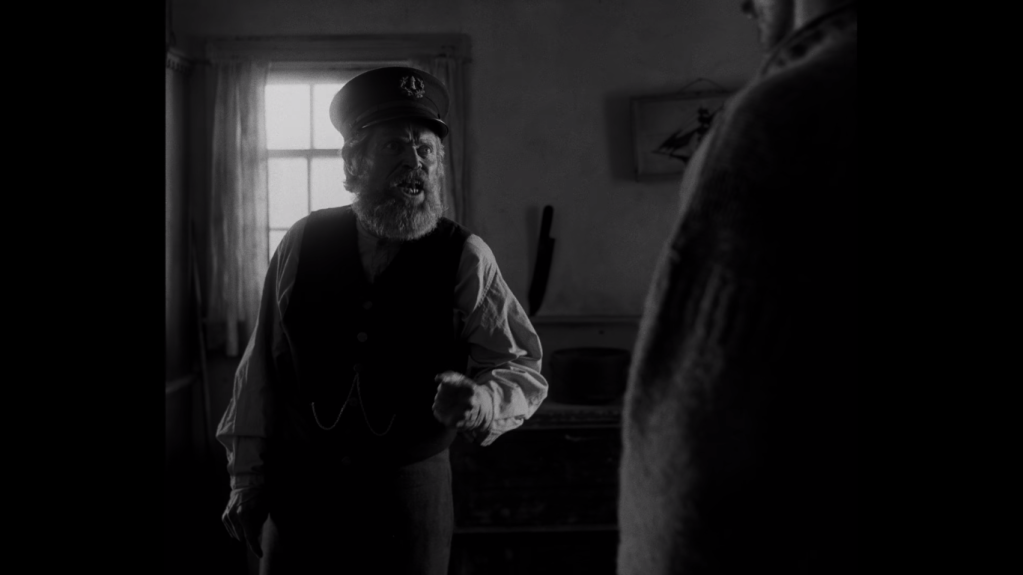
Not only is Ephraim subjected to inglorious manual labor by Tom throughout the movie; not only is Ephraim constantly criticized throughout the movie, culminating in Tom’s logbook full of Ephraim’s many supposed infractions; and not only is Ephraim led to disaster by many of Tom’s actions (such as the insistence on constantly getting drunk (which Ephraim is later blamed for)), but Ephraim is then told he isn’t even special in any way, and his existence as an individual is denigrated to a final extreme
Tom calls Ephraim, “A painted actress, screaming in the footlights, a bitch what wants to be coveted for nothin’ but the silver spoon what should have been yours.” Ephraim begins crying here, for which Tom mocks him. As this scene escalates, Tom begins calling Ephraim a dog over and over again.
“Thomas [Ephraim], ye’re a dog! A filthy dog! A dog!”
All Ephraim wants is a life free of servitude and domination. He tells Tom at one point, “I ain’t never intended to be no housewife or slave.” And yet, despite his dreams of freedom, he seeks that freedom through servitude, by taking a job to save up money. Anyone and everyone can sympathize with the desire to be free, the necessity of working for this freedom and the eventual boot on our necks that weighs heavier and heavier with each passing day. Perhaps there is nothing special with Ephraim, as he is just like everyone else, but it’s that normalcy that makes him such an empathetic individual, and why his role as the Everyman plays such an integral role in the meaning of this story.
Connecting this back to the Ego, all of us, in our immediate, conscious sense of reality, are confronted on the psychic level by the injunctions of the Super-Ego (society, law and order, Tom, God the Father) and the needs of the Id (survival, sexuality, the Siren, Mother Nature). Among the injunctions of the Ego, however, is that we accomplish this in a manner that will maintain our dignity and ensure our freedom and independence. Survival, security and self-dignity are three of the deepest desires of every human, and they all stack like weights on the shoulders of the Ego: that which consciously perceives and consciously decides.
There is a Camusian element of absurdity in this movie. Ephraim took the job as lighthouse keeper out of sheer arbitrariness. It paid well, that was it. Tom treats Ephraim like dogshit for no real reason, other than the fact he has the authority to, and then randomly starts treating him warmly at various moments.
At the end of the film, Ephraim is judged by Tom both verbally and in his logbook, and that judgement is almost entirely arbitrary. Some of the things Ephraim did were reprehensible. Some of the things Ephraim did weren’t. Some of the things Ephraim is judged for have no evidence to back them. Some of the things Ephraim were judged for were influenced by Tom himself. And that’s fucking life.
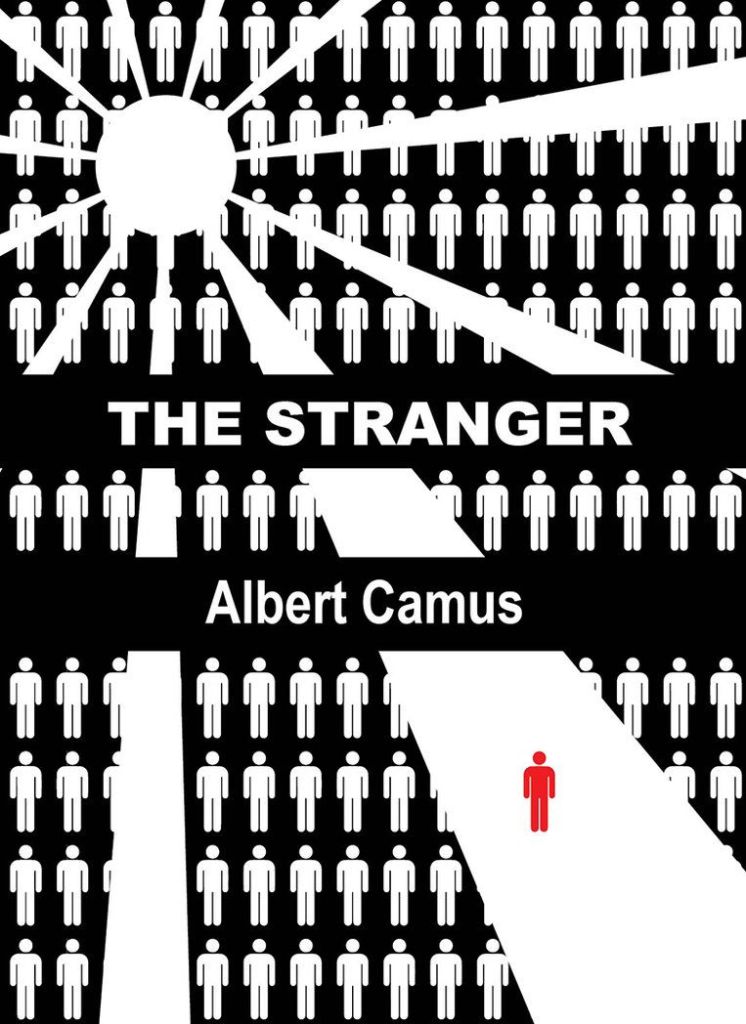
These events have parallels to one of the greatest works of absurdist art, Albert Camus’ novel, “The Stranger”, in which the protagonist’s mother dies one day, and he feels indifferent about this (death just happens, and why should we act one way or another about it). The protagonist’s neighbor is a volatile human, who careens between abuse and friendliness. A woman randomly begins having sex with the protagonist, then wants to know if he’ll marry her. He tells her it wouldn’t make any difference to him, and later tells her that marriage wasn’t special and he would have married any woman. In a half-awake daze, the protagonist is walking on the beach and runs into a man he knows nothing about, except that he has a feud with the protagonist’s friend, and so the protagonist kills this man for no real reason.
In the end, the protagonist is brought to court for killing this man and is found guilty essentially because he doesn’t feel one way or another about things. The primary evidence used against him is the fact he felt indifferent about his mother’s death. Things simply are the way they are, and the protagonist simply acts the way he acts out of his own detached volition. Because the protagonist does not wish to play the same games as everyone, carry the same sense of morality and imbue things with the same emotional weight as everyone else, he is sentenced to death, he is hated and he is, essentially, declared evil. The protagonist finally accepts his fate and accepts the absurdity of life.
“As if that blind rage had washed me clean, rid me of hope; for the first time, in that night alive with signs and stars, I opened myself to the gentle indifference of the world. Finding it so much like myself—so like a brother, really—I felt that I had been happy and that I was happy again. For everything to be consummated, for me to feel less alone, I had only to wish that there be a large crowd of spectators the day of my execution and that they greet me with cries of hate.”
I would argue that meaningfulness—true meaningfulness—can be found in life, but there is indeed an enormous degree of arbitrariness to reality. We’re just born one day, in a certain period of history, which has its own set of rules and customs we’re told to abide by. We’re told to be a certain person, to act a certain way and to feel certain emotions for given events, and we’re told not to question any of it. We’re called a villain for questioning or going against the status quo. We’re judged for things that are out of our control, or that have no real impact on life. There are seemingly arbitrary standards and traditions by which we’re judged, and then there’s entirely novel arbitrariness by which we’re judged (things that aren’t even a part of broadly accepted standards), and then there’s false or fabricated claims about us by which we’re judged.
This is the weight foisted upon Ephraim, the weight of arbitrary judgement, and this is the weight foisted upon the Everyman, the proxy of the collective individual or collective Ego. This is the weight carried by everyone living within a society. This is the guilt and condemnation which degrades: the arbitrary tyranny: the absurd, laughable, comically bizarre oppression of culture. And yet, that’s just life. Camus’ protagonist in “The Stranger” becomes what Camus called an Absurd Hero. The Absurd Hero is the individual who does not shy away from or seek to destroy the absurd reality around them, but rather accepts the empty arbitrariness of life and continues to live their life as an individual: continues to affirm life as being good and worthy, without the dishonesty of dogma, ideology or personal delusion. Shy of eradicating life, or at least eradicating your own life, one must learn to live heroically amidst absurdity, to remain free, individualized and dignified amidst our bizarre world because there is no escape from the necessary evil that is society, which is the Super-Ego, which is Tom.

Tom is the nagging, oppressive and at times nonsensical voice of the Super-Ego within Ephraim’s mind. Tom is the smiling, friendly face of society, which barks commands at us, and condemns our actions with spite and fury. Tom is society keeping Ephraim from achieving individuality by flooding his life with menial tasks, deprecating the value of the individual and forbidding Ephraim from witnessing the divine, and Tom is the same society which asks Ephraim to be as a friend: to love Tom, to forgive and overlook Tom’s flaws (of which, as we see at the end of the movie, Tom seems completely blind to).
Tom is what pushes Ephraim to insanity, and then denounces Ephraim as a madman. And yet, Tom is also what guides and protects Ephraim. There is an ambiguity in the nature of Tom and Ephraim’s relationship, just as there is an ambiguity in the nature of the Ego and Super-Ego’s relationship. The Super-Ego is typically represented in mythology as God the Father, or as some other variant of the masculine-authority archetype, which is simultaneously protective and wise, and oppressive and tyrannical.
It is culture and society which protect us from the ravages of nature, and it is culture and society which tyrannize us with unyielding dictates. It is culture and society which rewards us meaningful work, and it is culture and society which enslave us with meaningless tasks. It is culture and society which gives us the wisdom of tradition, and it is culture and society which fascistically conforms individuals with this tradition.
In “The Lighthouse”, we quite clearly witness this paradoxical relationship between Ephraim and Tom, the Son and the Father, the Individual and the Society, the Ego and the Super-Ego. Tom teaches and guides Ephraim. He tells Ephraim when he’s doing something wrong or foolish. We see this in the concrete form when Ephraim carries the drum of oil up the lighthouse stairs rather than fill the small pail with oil, and we see this in the absurd form when Tom superstitiously warns Ephraim of the dangers of killing seabirds, which he later explains are the souls of dead sailors. There’s an ambiguity even in this superstitious tradition, since Ephraim’s act of killing the seagull that’s been harassing him is implicated as the cause of the storm which maroons them on the island.
Tom is also a part of what protects Ephraim from the terrors of nature. Tom cooks food to feed Ephraim, keeping him from starving; Tom gives orders to Ephraim to maintain the house they live in, thus protecting them from the cold and the rain; and Tom gives Ephraim advice that helps him stay alive and healthy. The island is a lone territory of protection from the chaos of the ocean (the suffocating depths, the dehydrating waters, the monsters of the sea), and the lighthouse itself is a mechanism of security: a light in the dark which keeps sailors from crashing their ships in the night.
Yet, Tom is also the highly critical or judgmental aspect of society and the oppressive or tyrannical aspect of society. Tom is constantly criticizing Ephraim, telling him how poorly he’s performing his tasks, even at one point asking Ephraim if he’s a “dullard”. Tom not only criticizes Ephraim’s work, but also criticizes Ephraim as a person, essentially calling him boringly normal and morally reprehensible throughout the film.
Beyond just the criticism, Tom is constantly giving Ephraim orders and loading him up with manual labor, while Tom’s sole responsibility (beyond making sure Ephraim is performing his tasks) is to man the lighthouse lamp, which is the most glorious and honorable of tasks. Tom gives Ephraim all the shit jobs, while Tom gets to perform the single easiest and most respectable job. Even then, Tom does his one job poorly and strangely. While manning the lighthouse lamp at night, Tom drinks and, presumably, masturbates (though we’re not shown Defoe’s jerk sessions as explicitly as we’re shown Pattinson’s). Tom orders Ephraim around and judges him for all his faults, while declaring himself to be the unfaultable and supreme authority of the island.
And, just to hammer it home, that’s life.
You can’t live with society, and you can’t live without it.
So where does Ephraim’s heroism come in this story? It comes in his insanity, as it does with every individual striving for freedom within society.

It comes, initially, from his repeated visions of the mermaid and her siren’s call. I’ve come to believe the mermaid is symbolic of three things.
The mermaid is Ephraim’s Id, represented as his sexual desires (the siren’s call). The mermaid is Ephraim’s Anima, which, in Jungian psychology, is the feminine, psychic force in men, which guides the Ego into the depths of the psyche. The mermaid is also Ephraim’s Shadow, or at least that which guides Ephraim to his Shadow. In Jungian terminology, the Shadow is the repressed part of the psyche, oftentimes synonymous with the Id, though not necessarily. The Shadow is the parts of our personality that we bury or repress, such as sexuality, aggression and even self-importance or self-love. Though the Shadow contains many negative aspects of our personality, those aspects of our personality might be what save us from the problems of our lives. Holding back the contents of the Shadow holds back the individual’s potential for actualization, or from becoming the free, independent, dignified individual we all hope we can become.
The mermaid in Ephraim’s hallucinations is repeatedly coupled with the image of Ephraim’s previous foreman, whom Ephraim effectively murdered by letting him drown. Throughout the movie, Ephraim is repressing three things: his sexuality, through nearly constant masturbation, his aggression, the same aggression that let Ephraim dispassionately watch his foreman die, and his desire to see the lighthouse lamp. The ultimate repression is the latter, repressing the desire to climb to the top of the lighthouse. The lighthouse is a phallic symbol of divine power, which is roughly parallel to Ephraim’s inner divine power, which is roughly akin to the Libido. The lighthouse can also be seen as a symbol of social power, as in the social hierarchies of society, or as moral authority, the light being the highest moral good.
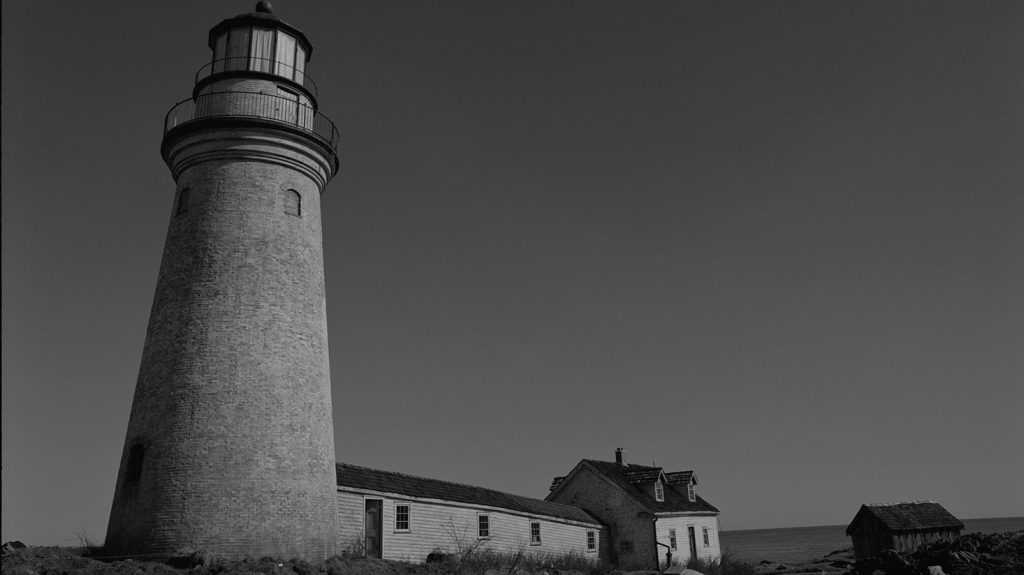
Though I argue the lighthouse to be a symbol of psychological hierarchy, I would also argue the lighthouse is symbolic of all three of these at once, and that these representations may in fact be synonymous with each other at a certain level of analysis.
Ephraim represses this divine power, the psychic energy of the Libido, through masturbation, and, by repressing his aggression, represses his ability to overthrow Tom, the Super-Ego, which is also denying him his divine power. Throughout the movie, Ephraim masturbates to a small, ivory trinket carved in the shape of a mermaid. He’s not actually having sex, he’s not actually incorporating the repressed portions of his psyche; he’s fantasizing about the act and arbitrarily giving himself pleasure and release from the repressed Libido. He’s worshipping a false idol, he’s worshipping a fetish, and he’s silencing the siren’s call by sexual release, rather than actually uniting himself with those repressed forces (the divine or psychic marriage).
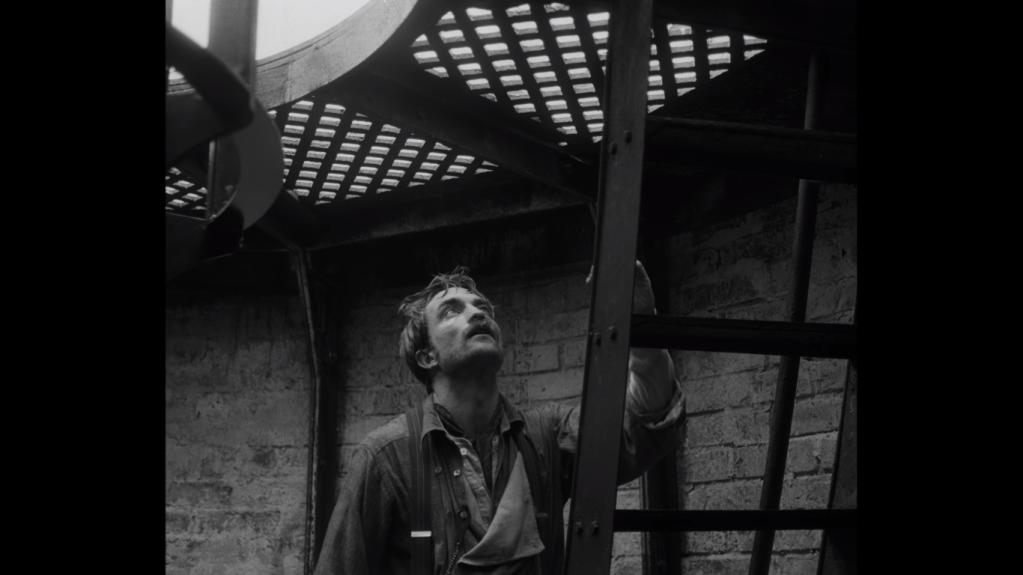
Ephraim is keeping himself from attaining his desires by shutting down and repressing those desires with short-term gratification. Ephraim wants to be a free human being, that is his ultimate desire. He wants to have power—not power over others, but power over himself: not the power of authority, but the power of individuality. However, rather than fulfilling that desire, Ephraim spends most of the movie bending to the will of Tom, the Super-Ego, or, in other words, bending to the will of society. At the end of the movie, Ephraim fulfills this desire by first destroying the mermaid trinket, the object of false sexual desire, and then by killing Tom, the judgmental and tyrannical force of society. It’s at this point that Ephraim finally ascends to the top of the lighthouse and finally witnesses the glory of the fire within the lighthouse lamp.
What is the lighthouse, and what is this divine power within its lamp? The lighthouse symbolizes a number of things. It is that which protects sailors from death as they sail through the horrors of the night. It is that which is most high upon Ephraim and Tom’s little rock, as well as that which shines most brightly. It is the most valued and coveted thing upon the island, and it is the most important thing on the island (it’s literally the only reason they’re there). The lighthouse is also a phallic symbol (among many), as previously mentioned, and an analog in some ways to Ephraim’s sexual frustrations. He is denied actual sexual release, and he is denied access to the top of the lighthouse.
I mentioned earlier that the lighthouse is the Self or the Godhead, which it is, to a certain degree. It is the source of divine power within ourselves. It is the axis mundi, source of all life-renewing energy: the world navel.
As Joseph Campbell explains in “The Hero with a Thousand Faces”:

“The torrent pours forth from an invisible source, the point of entry being the center of the symbolic circle of the universe, the Immovable Spot of the Buddha legend, around which the world may be said to revolve… The tree of life, i.e., the universe itself, grows from this point. It is rooted in the supporting darkness; the golden sun bird birches on its peak…Or the figure may be that of a cosmic mountain, with the city of gods, like a lotus of light, upon its summit…”
The lighthouse is the axis mundi, with the bright, burning spirit or entity of light at its top (sunbird/phoenix, city of gods, lotus of light, etc.), and it is from the lighthouse that Ephraim discovers reinvigorating, life-giving energies.
However, there is more to the lighthouse than simply this. What is interesting about this Axis Mundi or Godhead (this source of divine energy and the divine “Self”), is that it is manmade. The center of Ephraim and Tom’s universe is a manmade construction, and it is designed to keep sailors safe amidst the ocean’s turmoils. In some sense, this is showing that the new source of rebirth comes from the humanity’s creations, or their ability to create, alter the world around us and constantly innovate.
The new source of divine energy comes not from our ability to confront the natural world and its horrors, or from society and its oppression, but from our ability to create, a traditionally divine ability in itself, and through our creations, alter nature and alter society. Originally, creation was seen as the province gods, and then, in the West, the cosmos was seen as crafted by Jehovah or Yahweh, the Judeo-Christian God. Now, the divine power of creation is a human power.
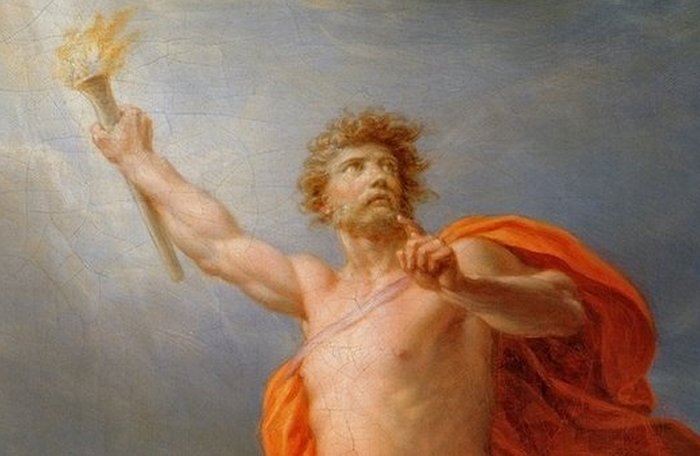
Now, there’s another piece here, you may have already noticed it, and this is the Greek story of the Titan, Prometheus. There are many details and variations to the myth, but the central story is that Prometheus stole fire from the Greek gods and gave it to humans. As punishment, Prometheus was chained to rocks, and everyday his liver was eaten by an eagle. This almost directly parallels the ending of “The Lighthouse”, in which Ephraim “steals the fire” from the lighthouse lamp and is then seen lying naked across oceanside rocks, his insides being eaten by seagulls.
To add to this, one of the details of the broader Prometheus myth is that Prometheus is seen as a hero in a Greek Deluge or Flood myth. The son of Prometheus, Deucalion, builds a boat with the help of his Titan father, and Deucalion and his wife survive a massive flood brought on by the wrath of Zeus. Just before the climax of the story, there is a similar flood in “The Lighthouse”. During their night of drinking lamp oil/kerosene, the unending storm that has been assaulting Tom and Ephraim floods the lighthouse and ruins the interior.
There are two things to parse apart here: Prometheus and the Deluge, or the Flood.

Beginning with the Deluge, because it occurs first in “The Lighthouse”, the Great Flood represents the Flood of Chaos. In mythology, from Greek mythology to Judeo-Christian myth, the Flood is typically a punishment on humanity because of their hubris or their sins. Why is a society of sinners punished with a flood? Because they were too arrogant to prevent or prepare for a flood. The floodwaters represent the accumulation of Chaos, disorder or poor behavior, accumulating over time until the water level, or the Chaos level, is too high to stop.
If a society, a group of people or even a single individual do not take the time to deal with all the small annoyances of their lives, or all the small problems they know they should fix (internally or externally), those problems begin to accumulate until your life is flooded with them. Maybe there’s a leak in your roof, and you do nothing about it. Maybe there’s some damage to the electrical circuits in your house, and you put off having it repaired. Maybe you feel like you should buy home insurance, and you never do.
Maybe that leaky roof keeps getting worse: the wood rots and more water gets into your house every day. Maybe the state of the wiring in your home continues to deteriorate, and maybe it does so without your knowledge because you don’t think it will ever be a problem. Maybe one day, a huge storm rolls over the city you live in, and your roof does nothing to keep your house dry. The water comes into the attic, maybe it drenches your floors, maybe it interferes with the damaged electrical circuits, and maybe the day after the storm, you’re left with a water-damaged house, ruined furniture and no electricity, and there’s nothing you can do about it because you don’t have home insurance. That’s the Deluge.
It doesn’t have to actually involve water, it might involve parking tickets, or it might involve bill collectors, or it might involve that skin rash you’ve been hiding for three months, hoping it’ll magically go away, or it might involve the steady and growing supply of alcohol you’ve been consuming for ten years, or it might involve anything in your life that you know you should have fixed, prevented or prepared for, but didn’t.

In “The Lighthouse”, the Deluge begins with Ephraim killing the seagull, thus bringing on the near-unending storm as a result. Once Tom and Ephraim are thoroughly marooned on the island, they begin drinking copious amounts of alcohol, which results in them acting irrationally, damaging parts of the house and not performing their tasks as well as they should be. In the end, the storm floods the lighthouse and ruins the interior of the first floor, but the question here is:
Was it the storm’s fault? Or was it their fault?
The other part of this is the Promethean mytheme of stealing the fire.
If Prometheus stole the fire of the Olympic gods, and Ephraim’s tragic character arc is a parallel to Prometheus’s, then what fire does Ephraim steal?
Here, I come back to the Self and Ephraim’s desire to unify with his inner, “divine” Self.
Ephraim has two core desires within “The Lighthouse”. One is to become a free, independent individual, and the other is to gain access to the lighthouse lamp. The desire to become free and independent aligns with the Jungian notion of Individuation or Actualization, in which an individual unifies the disparate portions of their psyche or personality (their Ego, their Super-Ego and their Id, for simplicity), in order to become the greatest version of themselves: in order to become a complete, unified individual. Once they become this complete, unified version of themselves, they are capable of actualizing their fullest potential. They become a person who is fully equipped to seek out and satisfy their deepest desires.

Another description of the Jungian process of Individuation and Actualization is unifying oneself with the deeper Self, the True Self. There are the superficial, extrinsic and animalistic parts of one’s personality: the Persona—the mask we wear for society—the Ego, the Super-Ego and the Id. Then there is the deeper part of one’s personality: The Self. The Self is our true identity, the unified whole of our fragmented personality, where our most pressing desires and profound personal capabilities reside.
It is this Self, this deeper source of individuality and personal power, which Ephraim is seeking throughout the movie, both as his desire for freedom and his desire for the lighthouse lamp.
In this sense, the Self, the divine spark of the Godhead, is what Ephraim is stealing and giving to humanity. The cure for a sickly, stagnant or corrupt society—symbolized by Tom—does not come from a collective—the cure for society isn’t society. The cure for society is the individual capable and willing to transgress society. Ephraim’s theft of the divine flame—of the inner Self—is punished in the form of laying naked across rocks and being eaten alive by seagulls, which is a reflection of the actual punishment such an accomplishment might engender. Much of the writing of Friedrich Nietzsche centered around the notion of the Ubermensch or the Superman, a hypothetical individual Nietzsche posited as not only being able to overcome the horrors of nature and the shackles of society, but also capable of overcoming themselves and their own flaws—an individual capable of personal greatness. However, this Superman is an individual who is misunderstood by broader society, sometimes envied, oftentimes villainized, and, in many cases, abused by society.
Ephraim achieves Individuation and Actualization, then returns this divine spark of freedom and personal power to society—symbolized by him falling back down the lighthouse, or falling back to Earth—but then is punished for the very same act. Ephraim steals the fire of the lighthouse, returns to society, and then is consumed by the souls of dead sailors. Not only is he consumed by the souls of the dead sailors, but he was never saved by living sailors—no one came to rescue him from his isolated island.
In this sense, Ephraim becomes like the lighthouse. He becomes the beacon of light keeping sailors across life’s ocean from death. However, twisting the meaning of Ephraim’s punishment a bit, he, like the lighthouse, becomes a stationary object, neglected by the very people he has saved. Not only is he neglected, but he is also abused by those he couldn’t save—the sailors who weren’t saved by the lighthouse. This could be guilt, these could be parasites of society, or these birds could be metaphoric critics eating Ephraim alive.
The lighthouse is revered, and yet it is also an object used as a lifeless tool by the society that reveres it. Ephraim saves society, so to speak, by his actions, but then is left for dead and eaten alive by that society. No deed goes unpunished.
Now, despite the dissections of these symbols, the meaning of the story still hasn’t fully been articulated.
“The Lighthouse” is a movie about an individual attempting to maintain their individuality within the confines of the Id and the Super-Ego, but, moreover, attempting to transcend those confines in order to save that society. Ephraim and his story are offered up to us like a sacrificial lamb to feast upon. The lighthouse is a construction of individuals, and this construction is a gift to society, a gift which is both revered and abused. Similarly, we in our own lives can become individuated and actualized human beings, which in turn makes us beacons of light that save our society from death at sea. This in turn makes us something like sacrifices to the society we are trying to save.
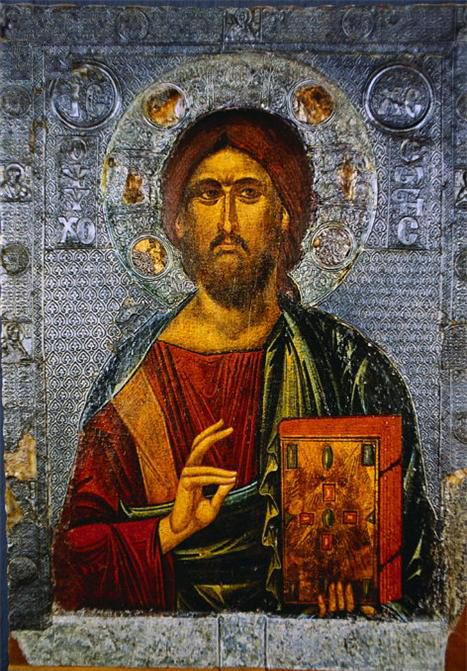
Now, there’s an interesting dynamic to this all. The individual attempting to save society—the individual stealing the fire from the gods—must first transcend or overcome society in order to then save society. This exact structure can be found in the Christ myth.
Christ is born on Earth as a normal human. Christ led a revolutionary movement in his society, rebelling against the authorities of that society, as well as challenging the traditions and social norms of that society. Christ was then crucified for his rebellion and revolution. And yet, there is an even deeper sub-structure to this.
It is interesting to note that this film takes place in the late 1800’s, which was around the same time Nietzsche made his famous declaration, “God is Dead”.
“God is dead. God remains dead. And we have killed him. How shall we comfort ourselves, the murderers of all murderers? What was holiest and mightiest of all that the world has yet owned has bled to death under our knives: who will wipe this blood off us? What water is there for us to clean ourselves? What festivals of atonement, what sacred games shall we have to invent? Is not the greatness of this deed too great for us? Must we ourselves not become gods simply to appear worthy of it?”
In order for Ephraim to ascend the lighthouse and steal its fire, he first had to kill Tom.
As I mentioned before, the Super-Ego is often symbolized mythologically as God the Father, or as the Benevolent or Tyrannical King. Society, as well as the fatherly-authority god, are both derivatives of the Super-Ego—the standards, traditions and practices of society which both protect and oppress us. Ephraim killed Tom, the analogue of Society, the Super-Ego and God the Father. It was only through this act that Ephraim was able to attain wholeness and individuality, but this was not necessarily a happy act. Through killing Tom, through killing God, Ephraim’s world fell apart, and he was punished for it.

Christ, by challenging society, by challenging the Jewish high priests and by challenging the governors of the Roman Empire, was in fact challenging God himself.
To dig deeper into this, and to dig deeper into what the Death of Christ ultimately means, I’ll now come to the work of the contemporary Hegelian philosopher, Slavoj Zizek. Nietzsche believed that Christianity, by holding Truth to be its highest virtue, was inevitably a self-extinguishing religion. It was Christianity’s insistence on Truth which led to the Age of Enlightenment, which led to Nietzsche’s claim that “God is dead”. In a similar vein, Slavoj Zizek has made claims that Christianity is in fact an atheistic religion.
In Slavoj’s words:
“I think that this [the story of Job] is maybe an incredible ethical revolution because this is already the first step out of this traditional pagan view where justice means you should be at your own place, do your particular duty, and so on and so on, you know, this withdrawal, which then I think culminates in the death of Christ.
“What dies on the cross? … As Hegel says, what dies on the cross is God of beyond himself. It’s precisely God as that transcendent power which somehow secretly pulls the strings. This is, I think, the secret of Christianity… This God abdicates. I think that something tremendous happens in Christianity because remember, after the death of Christ, we don’t get back to the father. What we get is Holy Spirit… So, for me, again, this is a tremendously important message of freedom.

“Again, as my beloved Chesterton said… in all other religions, you have atheists, people who don’t believe in God, but Chesterton‘s reading of those famous ‘Eli, Eli, lama sabachtani?’ (‘Father, why have you forsaken me?’) is that only in Christianity, and for him this is crucial, God himself becomes for a moment an atheist.”
To sum up what Slavoj is saying, though eroding much of the subtleties here, at Christ’s death, Christ looks up to the sky and asks, “Father, why have you forsaken me?” Here, Christ, being a manifestation of God himself, is God realizing the truth of his own non-existence.
The revolution of Christ was not the continuation of a religion, but the annihilation of a religion, albeit a slow annihilation, and, to this day, not a complete annihilation (which might be evidence of the psychological vitality of the Christian myth). Christ: the Logos, the Word of God, the Truth made Flesh—Christ is what killed God.
The resurrection of Christ is not the resurrection of the flesh, but the resurrection of the spirit. Christ as spirit—Christ as the spirit of the Logos—paradoxically could only be kept alive by the Death of Christ as flesh, or by the Death of God by science and the Enlightenment. And now, this concept of the Spirit, decoupled from God as flesh and God as Divine Authority, lives on with us as the Logos, or rational thought and truthful speech.
Just as God died because of what Christianity valued most highly—the Logos, or the Truth—Tom, the analogue of God, died because of what he valued most highly, the lighthouse, or the Divine Self. It was Ephraim, the analogue of Christ, who killed Tom and sacrificed himself for the betterment of society. Just as Christ was the Logos, or Truth, made flesh, and it was Truth which murdered God; Ephraim was the Self, or Individuality, made flesh, and it was Individuality which murdered Society.
Just as Christ saved society and saved God by killing both society and God with Truth, Ephraim saves society and saves the fire of Individuality by killing Tom and both murdering and sacrificing himself to society with Individualism. In both stories, the murders are in fact suicides. God the Father, the manifestation of society and the Super-Ego, the manifestation of the crowds at Judaea, sends Christ as a sacrifice to die at the cross, and, in doing so, sends himself to die at the cross. Christ, the manifestation of the Logos, kills God, thus killing himself. Ephraim’s real name is Thomas. This means that Thomas killed Tom, and, in doing so, Tommy essentially sacrificed himself.
Just as Catholics consume the body and blood of Christ, an act of ingesting the divine Logos, the seagulls now consume the body and blood of Ephraim, an act of ingesting the divine Self. Christ will become resurrected as the Holy Spirit, the dove, and Ephraim will be resurrected as the soul of a dead sailor, a seagull.
Eat up, seabirds.
